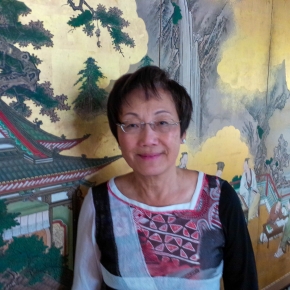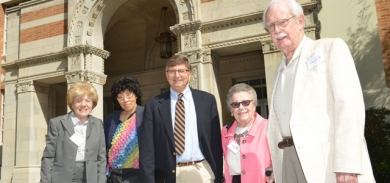Gary Segura Named UCLA Luskin Dean A faculty member at Stanford since 2008, Segura is the Morris M. Doyle Centennial Professor of Public Policy and professor of political science and Chicana/o studies
By George Foulsham
Gary Segura, the Morris M. Doyle Centennial Professor of Public Policy and professor of political science at Stanford University, has been named new dean of the UCLA Luskin School of Public Affairs.
“Chancellor [Gene] Block and I are confident that Gary will provide outstanding leadership as dean of the UCLA Luskin School of Public Affairs,” Executive Vice Chancellor and Provost Scott Waugh said in an announcement.
Segura’s anticipated start date is Jan. 1, 2017. He will succeed Lois Takahashi, who has served as interim dean since August 2015.
“I am honored and excited to be selected as dean of the Luskin School of Public Affairs, and to come to UCLA,” Segura said. “The Luskin School and its distinguished faculty represent an outstanding intellectual community whose work makes important contributions in addressing human problems at the individual, community, national and global levels. The three nationally prominent departments and the affiliated centers are asking and answering critical questions about the challenges — personal and structural — that real people face every day. It will be my privilege to join them and do whatever I can to broaden and deepen their impact in Los Angeles, across California and beyond.”
A member of the Stanford faculty since 2008, Segura is also a professor and former chair of Chicana/o-Latina/o studies. Additionally, he is a faculty affiliate of African and African American studies; American studies; feminist, gender and sexuality studies; Latin American studies; and urban studies. In addition, he is the director of the Center for American Democracy and the director of the Institute on the Politics of Inequality, Race and Ethnicity at Stanford.
In 2010, Segura was elected as a fellow of the American Academy of Arts and Sciences. Prior to joining Stanford, he was a member of the faculty at the University of Washington, the University of Iowa, Claremont Graduate University and UC Davis.
Segura received a bachelor of arts magna cum laude in political science from Loyola University of the South, and a master’s degree and a Ph.D. in political science from the University of Illinois at Urbana-Champaign. His research focuses on issues of political representation and social cleavages, the domestic politics of wartime public opinion and the politics of America’s growing Latino minority.
Segura has published more than 55 articles and chapters, and he is a co-editor of “Diversity in Democracy: Minority Representation in the United States” and a co-author of four books: “Latino America: How America’s Most Dynamic Population is Poised to Transform the Politics of the Nation”; “Latinos in the New Millennium: An Almanac of Opinion, Behavior, and Policy Preferences”; “The Future is Ours: Minority Politics, Political Behavior, and the Multiracial Era of American Politics”; and “Latino Lives in America: Making It Home.”
Active in professional service, Segura is a past president of the Western Political Science Association, Midwest Political Science Association and Latino Caucus in Political Science. From 2009 to 2015, he was the co-principal investigator of the American National Election Studies. Segura has also briefed members of Congress and senior administration officials on issues related to Latinos, served as an expert witness in three marriage equality cases heard by the Supreme Court, and has filed amicus curiae briefs on subjects as diverse as voting rights, marriage equality and affirmative action.
“I am thrilled that Gary Segura is taking the helm as the next dean of the Luskin School,” Takahashi said. “He is the perfect leader to bring the Luskin School into its next phase of growth. I look forward to working with him on what I know will be a smooth transition.”
In his announcement, Waugh praised Takahashi and the search committee.
“I want to thank search/advisory committee members for assembling an outstanding pool of candidates and for their roles in recruiting Gary,” Waugh said. “I also want to recognize and thank Lois Takahashi for her distinguished leadership of the school as interim dean during the past year.”
The search committee was chaired by Linda Sarna, interim dean, UCLA School of Nursing; professor and Lulu Wolf Hassenplug Endowed Chair in Nursing. Other members were: Rosina Becerra, professor of social welfare; Evelyn Blumenberg, professor and chair, Department of Urban Planning; Michael Chwe, professor of political science; Todd Franke, professor and chair, Department of Social Welfare; Vickie Mays, professor of psychology, and of health policy and management; Mark Peterson, professor and chair, Department of Public Policy, and professor of political science and of law; Susan Rice, chair, UCLA Luskin School of Public Affairs Board of Advisors, and senior consulting associate, Brakeley Briscoe Inc.; Daniel Solorzano, professor of social sciences and comparative education, GSE&IS; and Abel Valenzuela Jr., professor and chair, César Chávez Department of Chicana/o Studies, and professor of urban planning.




